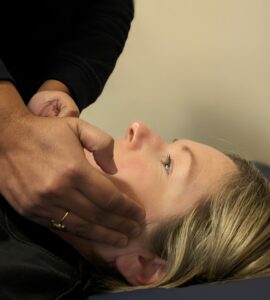Jaw Pain And Physiotherapy
 Temporomandibular Disorder (TMD), or jaw pain is one of the many problems treated by a physiotherapist. The temporomandibular Joint (TMJ) is located just below your ears where the jaw meets the temporal bone of the skull. It is supported by ligaments and a disc and is controlled by various muscles around the skull, neck and spine. It helps us in the function of yawning, chewing and eating.
Temporomandibular Disorder (TMD), or jaw pain is one of the many problems treated by a physiotherapist. The temporomandibular Joint (TMJ) is located just below your ears where the jaw meets the temporal bone of the skull. It is supported by ligaments and a disc and is controlled by various muscles around the skull, neck and spine. It helps us in the function of yawning, chewing and eating.
Symptoms of TMJ disorders
TMD or jaw issues often present with pain around the neck, cheeks, temples or ears with other symptoms. Some of the most common complaints are:
- Aching around the side of the face or around the ears
- Pain with eating, talking, yawning and chewing
- Pain and tenderness around the jaw
- Jaw clicking, locking or grinding
- Deviation of the jaw while opening and closing mouth
These complaints can be due to many problems such as
- History of grinding or clenching teeth
- Jaw injury (direct trauma to the jaw while playing sports)
- Dental procedures requiring the mouth to be open for extended periods of time
- Emotional or physically stressful events
- Referred pain from the neck
How can your physiotherapist help?
Your physiotherapist will take a full history on initial assessment to determine the cause and contributing factors and whether there is a need to assess them. This is followed by a through objective assessment of your jaw movements, muscle control, ligament tightness and assessing the neck if involved.
The treatment involves addressing the cause or the contributing factors which can be the root cause of the problem. An additional referral may be required if the condition is beyond the scope of physiotherapy practice. Physiotherapy techniques to treat TMJ dysfunction may include manual therapy, soft tissue release around the jaw or the neck, muscle stretching exercises and postural re education of the neck if indicated.
Additional modifications may be in form of strengthening neck and shoulder blade muscles, modifying the foods to be eaten and addressing the stress component by meditation and jaw relaxation techniques.
If you have been experiencing ongoing TMJ pain – do not hesitate to book in for an initial physiotherapy appointment. Early management allows us to achieve excellent results within a shorter period of time.
Book online or call the clinic on 03 8555 4099
Written by Bhargavi Parab, Physiotherapist.


